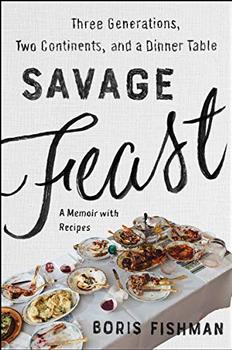Summary | Excerpt | Reviews | Beyond the Book | Readalikes | Genres & Themes | Author Bio
Three Generations, Two Continents, and a Dinner Table (a Memoir with Recipes)

Critics' Opinion:
Readers' Opinion:
First Published:
Feb 2019, 368 pages
Paperback:
Feb 2020, 368 pages
 Book Reviewed by:
Book Reviewed by:
Rory L. Aronsky
Buy This Book
All that changed with the war—it was as if Hitler had lost the war but won Stalin on the Jewish question. Paranoid and more concerned with centralization, fealty, and ideological homogeneity than ever, Stalin was planning a nationwide Jewish pogrom when he died. When a state begins to sponsor prejudice of this kind, its people listen, and Jewish life during the Soviet period was one of discrimination at best and physical danger at worst. (The steam baths my father and I visited every week stood on a street named for a seventeenth-century Ukrainian genocidaire of Jews, among others.) Things stayed this way until the 1970s, when a rising number of Soviet Jews managed to get out, thanks to nearly two decades of effort by Soviet refuseniks and American activists, and to the fact that the Soviet Union needed things. By the late 1970s, it had depleted its treasury to get ahead of the States in missile technology; meanwhile, the 1979 wheat harvest was disastrous. The USSR needed grain, and it needed the U.S. Congress to authorize an arms-reduction treaty. So that even though 1978 had been an especially oppressive year for the refuseniks—Natan Sharansky, perhaps the best known, was finally tried after more than a year in detention—in 1979, the doors opened.
The Soviet Union hardly wanted its Jews, but their departure presented two problems. First, brain drain: Many were the scientists and engineers who kept the USSR on pace with America. Then: How to grandstand to the world about the quality of Soviet life if people wanted to leave? Above all, the Soviet Union would not hand a victory to America. The Minsk Jews with apartments in desired locations—Lenin Prospect, Victory Square—got let go more easily. The rest the authorities discouraged however they could: They levied massive fees for renouncing citizenship and for the free educations the prospective emigrants had received. The higher the degree, the more money. My mother would owe four years of her salary. My grandfather chuckled at my father: "Good thing you didn't listen when we pushed you to go for more school." My father nodded evasively. "Good thing," my grandfather kept on, "I know how to make sure there's five grand stashed away when you need it." My father didn't argue. "Some people fly, and some people crawl," my grandfather tried. My father only shrugged.
Families were denied exit unless the entire extended family—which sometimes included ethnic Russians, who usually had no desire to go—agreed to leave. So that those wishing to depart would think again about where they were going, the KGB murdered several Soviet émigrés in Chicago, New York, and San Francisco, among them a woman we knew; she had just written home marveling at all the lovely old ladies walking around San Francisco with flowers in their hatbands. The television showed nothing but Skid Row in Los Angeles, defaced subway cars in New York, gangs of blacks on the streets, police nightsticks over stonelike Indian faces, and bodies rolled into drunk tanks like chattel.
Diplomatically, the face-saving solution went like this: Soviet Jews had religious brethren in Israel, the land of the Jews. For the humanitarian purposes of family reunification, the state, magnanimously, would release them. Soviet Jews almost never had breth- ren in Israel; Israel's postwar population arrived from elsewhere in Eastern Europe, Western Europe, the Middle East, and North Africa. But that didn't matter. A Soviet Jew wishing to leave got word to someone who got word to Israel, where an office invented an Aunt So-and- so in the city of Be'er Sheva who'd suddenly been afflicted by an inability to go on without her Soviet relatives. Sometimes things got mixed up and it was "Aunt Be'er Sheva" or "Uncle Haifa" whose name appeared on the invitation, but neither we nor our Soviet jailers knew the difference. There was no equally worked-out channel for getting our names and biographical details to the Israelis, however, so friends who had already gotten permission to leave sewed a little paper with the information into the elastic of a pair of underwear.
From the book Savage Feast by Boris Fishman. Copyright © 2019 by Boris Fishman. Reprinted courtesy of Harper, an imprint of HarperCollins Publishers.





The House on Biscayne Bay
by Chanel Cleeton
As death stalks a gothic mansion in Miami, the lives of two women intertwine as the past and present collide.

The Flower Sisters
by Michelle Collins Anderson
From the new Fannie Flagg of the Ozarks, a richly-woven story of family, forgiveness, and reinvention.

The Funeral Cryer by Wenyan Lu
Debut novelist Wenyan Lu brings us this witty yet profound story about one woman's midlife reawakening in contemporary rural China.
Your guide toexceptional books
BookBrowse seeks out and recommends the best in contemporary fiction and nonfiction—books that not only engage and entertain but also deepen our understanding of ourselves and the world around us.